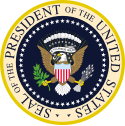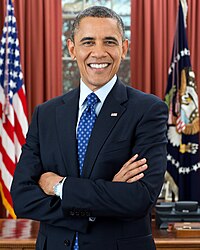President of the United States
| President of the United States of America |
|
|---|---|

|
|

|
|
|
Executive Branch of the U.S. Government Executive Office of the President |
|
| Style |
Mr. President (informal) The Honorable (formal) His Excellency (in international correspondence) |
| Member of |
Cabinet Domestic Policy Council National Economic Council National Security Council |
| Residence | White House |
| Seat | Washington, D.C. |
| Appointer | Electoral College |
| Term length | Four years renewable once |
| Constituting instrument | United States Constitution |
| Inaugural holder |
George Washington April 30, 1789 |
| Formation | March 4, 1789 |
| Salary | $400,000 annually |
| Website | Official website |
The President of the United States (POTUS) is the elected head of state and head of government of the United States. The president directs the executive branch of the federal government and is the commander-in-chief of the United States Armed Forces.
The President is considered to be one of the world's most powerful political figures, as the leader of the only contemporary global superpower. The role includes being the commander-in-chief of the world's most expensive military with the second largest nuclear arsenal and leading the nation with the largest economy by nominal GDP. The office of President holds significant hard and soft power both in the United States and abroad.
Article II of the U.S. Constitution vests the executive power of the United States in the president. The power includes execution of federal law, alongside the responsibility of appointing federal executive, diplomatic, regulatory and judicial officers, and concluding treaties with foreign powers with the advice and consent of the Senate. The president is further empowered to grant federal pardons and reprieves, and to convene and adjourn either or both houses of Congress under extraordinary circumstances. The president is largely responsible for dictating the legislative agenda of the party to which the president is a member. The president also directs the foreign and domestic policy of the United States. Since the office of President was established in 1789, its power has grown substantially, as has the power of the federal government as a whole.
...
Wikipedia

